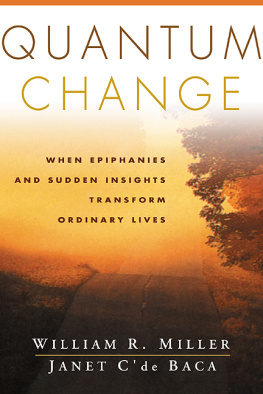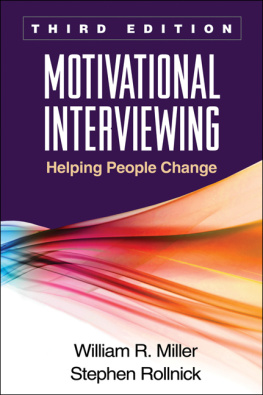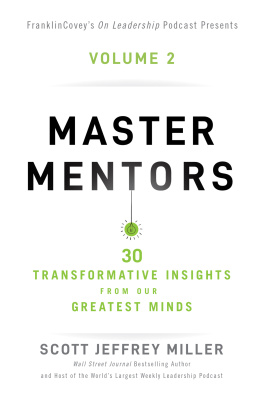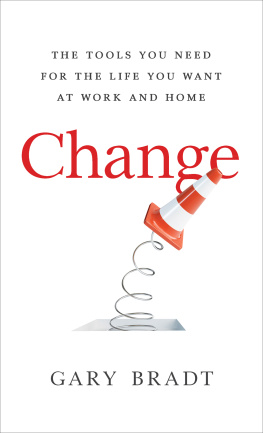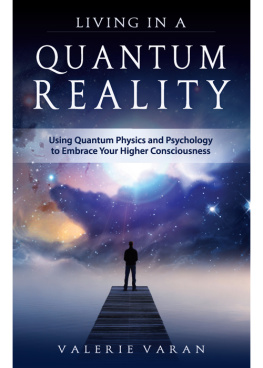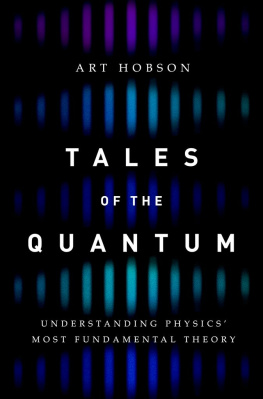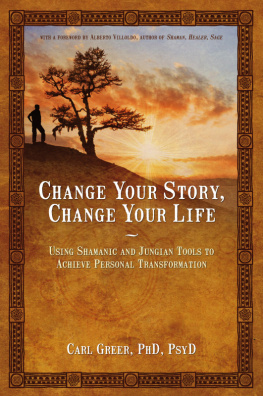QUANTUM CHANGE
To Kathleen,
who lovingly changed my future
WRM
To my son, Dirk,
whose arrival transformed my life
JC
E-Pub Edition ISBN: 978-1-4625-0436-7
2001 The Guilford Press
A Division of Guilford Publications, Inc.
72 Spring Street, New York, NY 10012
www.guilford.com
All rights reserved
No part of this book may be reproduced, translated, stored in a retrieval system, or transmitted, in any form or by any means, electronic, mechanical, photocopying, microfilming, recording, or otherwise, without written permission from the Publisher.
Printed in the United States of America
This book is printed on acid-free paper.
Last digit is print number: 9 8 7 6 5 4 3 2
Library of Congress Cataloging-in-Publication Data
Miller, William R.
Quantum change: when epiphanies and sudden insights transform
ordinary lives / by William R. Miller, Janet Cde Baca
p. cm.
Includes bibliographical references and index.
ISBN 978-1-57230-667-7 (hardcover)ISBN 978-1-57230-505-2 (pbk.)
1. Change (Psychology) 2. Epiphanies. 3. Insight. I. Cde Baca,
Janet. II. Title.
BF637.C4 M55 2001
155dc21 00-066340
CONTENTS
O ur first and foremost gratitude is to the fascinating people who opened their hearts and gave us the privilege of hearing their stories of quantum change. The stories intimately convey, in firsthand accounts, the dramatic changes that occurred in these lives. They are powerful stories. One is changed in the process of reading them. Without the generosity and openness of these fifty-five individuals, there would be no story to tell.
We are also grateful to the interviewers who volunteered their time to hear and record these stories. Through skillful and patient listening, they called forth the rich detail found in this volume. All were involved in some way with the Department of Psychology at the University of New Mexico: Janet Brody, Nan Henderson, Mike Hillard, Dan Matthews, Henry Montgomery, Pauline Sawyers, Tracy Simpson, and Carolina Yahne.
Others were helpful to us in conceiving and planning the study. In Sydney, Australia, a group met regularly in 19891990 to think through how one might understand and measure quantum change; participants included Eva Congreve, Ken Curry, Loretta Elkins, Janet Greeley, Rian McMullin, Merida NEnyar, Robyn Richmond, Steve Rollnick, and John Stanhope. Then in Albuquerque in 19911992 we were aided by preparatory discussions that included Lauren Aubrey, Skip Daniel, Kathryn Grant, Jim Story, and Ann Waldorf. We are grateful to them all.
Finally, thanks to Ernest Kurtz, who wrote the Afterword, for his collegial guidance, eloquent scholarship, inspiration, and friendship over the years. We share his impassioned love of stories and of the deeper truths to which they point.
I have always been fascinated by the story of Ebenezer Scrooge. It has all the trappings of an engaging tale, of course: a masterful opening line; gradual revelation; ghosts, love, money, children, suspense; sharply defined characters; and the tension of good versus evil, of self-centeredness versus compassion. Yet beneath the narrative line there is something more that speaks deeply and directly to the soul and that accounts perhaps for the enduring appeal of this particular story. Like great mythology, it contains shadows of profound truth. Like monks copying and protecting manuscripts through dark ages, it preserves for us the ever-present human potential for remarkable change.
It was during a sabbatical year in Australia that I began to think seriously about how one might study such change. Rereading the Dickens tale, it occurred to me that I had seen sudden and dramatic changes happen in real life. Perhaps my daughters own recent experience was the catalyst. I had seen Lillian shortly before we left for Sydney, and it was plain that something extraordinary had happened to her. I knew, I experienced in her a very different person from the raging teenager with whom I had spoken just a few days before. Sullen anger had been replaced with a peacefulness, with a gentle acceptance of what is and of what is not. I saw in her, at age fourteen, the sudden appearance of a quality I had not known in her before: the capacity for genuine empathy, for seeing the world and herself through the eyes and feelings of others. There was a settled peacefulness and maturity beyond her years. It had happened, she told me, within the space of an hour. Unexpected, unbidden, and in the silent privacy of her own experience, something had changed her. She had trouble putting it into words, but at some deep inner level I recognized the experience. To be sure, the struggles of adolescence were far from over, but these qualities have never left her, and have continued to deepen in the ensuing ten years.
I remembered, too, a remarkable tape recording that was tucked away on a dusty shelf in my office, a letter from my friend Don. Our friendship began on the very day we met, and for three decades now we have felt a close bond. Even when weve not seen each other for a year or two, we can pick up as though we have been in constant touch. We simply understand each other without much explaining, as though living different versions of the same life. He had been driving across the desert, taping a letter to us, when an overpowering experience simply overtook him and literally drove him off the road. He turned the recorder back on and talked through the immediacy of it, and that experience became a part of this book.
There were others I had known over the years whose lives were changed suddenly, dramatically, and undeniably for the better. Much as I would like to say that these rapid turnabouts occurred in my therapy office, they never did. Some were profoundly spiritual and mystical in nature, one literally on a mountaintop in the former Soviet Union. Others were turnabouts without a spiritual or supernatural overlay. They are the dramatic moments of transformation that are the stuff of psychotherapists dreams. Yet they seem to be of an entirely different quality from the usual, gradual changes that characterize peoples lives, including their achievements in therapy. I began referring to them as quantum change.
Scrooge, my daughter, Don in the desert, others I had met along the wayall mixed in my mind like old friends at a reunion, and the idea would not let me go: If such sudden, dramatic, and enduring changes do occur in real life and not just in fiction, I wanted to understand these transformations better, both as a psychologistscientist and as a person who has always been curious about human nature and change.
I spent my early career studying how to bring about gradual, step-by-step changes and how to make them last. That led me to studies of what motivates human change, why it happens. Now I was faced with one of the most fascinating puzzles of allthe nature of quantum changes. How were they connected to everything else Id studied? Why didnt they occur in my therapy office? Why did they happen to some people and not others? How enduring were their effects?
I began reading everything I could find and discovered that psychological science is pretty thin in this area. Instead, a picture began to emerge as I found pieces in fiction, biography, philosophy, theology, mathematics, and physics.
Still it was not theory but the real-life stories that seemed most compelling to me. Here were real people, not fictional characters, whose lives were changed forever in a matter of moments. Story, I sensed, is the heart of quantum change. Thus I set out, with the collaboration of Janet Cde Baca, to seek personal accounts from people who had experienced such changes. We had no idea what lay in store for us and just how many stories there would be. The ease of finding such individuals and the quality of their stories made it plain that quantum change is both real and not actually all that rare. We were struck by the diversity of the stories we heard, but also by some common threads that ran through them.

